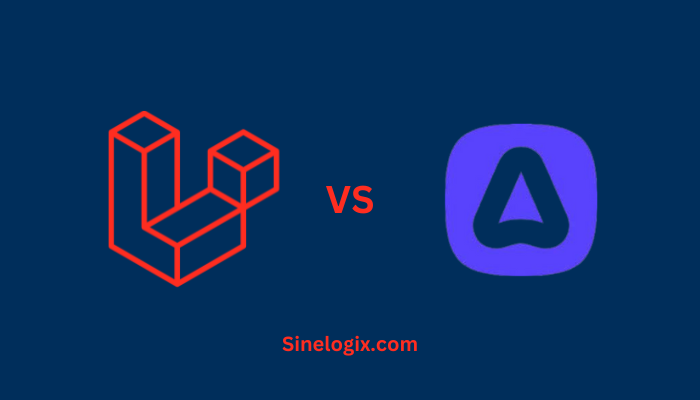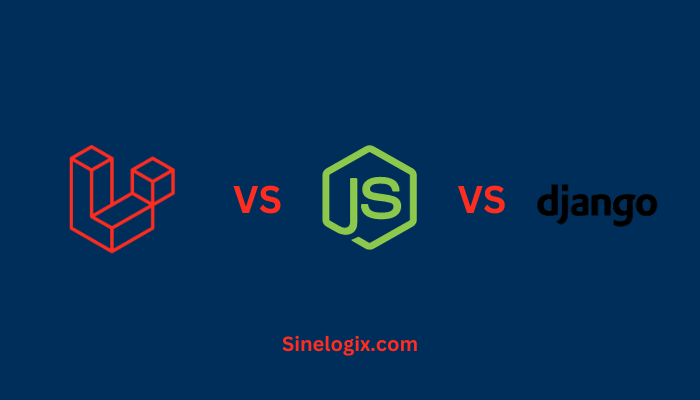Choosing the right web development framework is a pivotal decision that profoundly influences your project’s success. Laravel, a robust PHP framework, and AdonisJS, a Node.js framework, represent two powerful options with distinct strengths. In this in-depth comparison, we’ll explore 20 critical aspects to help you make an informed decision based on your project’s specific requirements.
Introduction
Web development frameworks play a crucial role in shaping the efficiency, scalability, and maintainability of applications. Laravel, deeply rooted in PHP, and AdonisJS, a modern Node.js framework, cater to different technology stacks. This detailed analysis aims to unravel the nuances of Laravel and AdonisJS across various dimensions, empowering you to choose the framework that aligns best with your project goals.
1. Architecture
Laravel: Laravel adopts the Model-View-Controller (MVC) architecture, providing a structured and organized approach to building applications. This separation of concerns enhances code organization and maintainability, making Laravel suitable for projects of varying sizes. Laravel’s architecture supports both monolithic and microservices architectures.
AdonisJS: AdonisJS follows the Model-View-Controller (MVC) architecture as well, providing a well-defined structure for building applications. AdonisJS emphasizes conventions, making it easy to organize code and collaborate on projects. The framework’s architecture is designed to be scalable, supporting the development of robust and modular applications.
2. Language
Laravel: Laravel is a PHP framework, leveraging the versatility and widespread adoption of PHP for web development. PHP’s expressive syntax and extensive ecosystem make Laravel an attractive choice for developers seeking a powerful yet accessible language for their projects.
AdonisJS: AdonisJS is built on Node.js, using JavaScript (or optionally TypeScript) for server-side development. The use of JavaScript enables developers to use a consistent language across both the frontend and backend, fostering code cohesion and collaboration.
3. Security
Laravel: Laravel is renowned for its robust security features, incorporating built-in functionalities like Cross-Site Request Forgery (CSRF) protection, encryption, and a dedicated security team. Laravel’s commitment to security reduces the risk of common web vulnerabilities, ensuring a secure development environment.
AdonisJS: AdonisJS prioritizes security and provides features such as a powerful query builder with built-in SQL injection protection, automated Cross-Site Scripting (XSS) protection, and a clear focus on secure coding practices. AdonisJS enables developers to build applications with security in mind.
4. Performance
Laravel: Laravel optimizes performance through features like opcode caching and efficient asset compilation using Laravel Mix. These optimizations contribute to faster response times and improved overall performance, making Laravel suitable for a wide range of applications.
AdonisJS: AdonisJS, built on the high-performance Node.js runtime, offers excellent performance for I/O-bound operations. Its asynchronous, non-blocking architecture ensures efficient handling of concurrent requests, making it well-suited for applications with real-time features.
5. Community and Ecosystem
Laravel: Laravel boasts a large and active community, contributing to a vast ecosystem of packages and plugins. The community’s engagement ensures continuous improvement, extensive documentation, and a wealth of resources for developers. Laravel’s ecosystem simplifies development tasks by providing solutions for a broad spectrum of functionalities.
AdonisJS: AdonisJS has a growing community that actively contributes to its development. The framework comes with its own set of modules and an ORM, contributing to a comprehensive ecosystem. While not as extensive as Laravel’s, AdonisJS’s ecosystem is expanding, driven by community collaboration.
6. Database Support
Laravel: Laravel’s Eloquent ORM supports multiple databases, including MySQL, PostgreSQL, and SQLite. This flexibility allows developers to choose the database that best fits their project needs. Eloquent’s intuitive syntax and powerful features make database interactions seamless and enjoyable for developers.
AdonisJS: AdonisJS includes its own ORM called Lucid, which supports various databases, including MySQL, PostgreSQL, and SQLite. Lucid follows an ActiveRecord pattern, providing an expressive and easy-to-use interface for working with databases.
7. REST API Development
Laravel: Laravel is renowned for its exceptional support for building RESTful APIs. The framework provides built-in features and additional packages that simplify API development. Laravel’s dedicated API tools, such as resource controllers and Eloquent resources, streamline the process, making it an ideal choice for projects with robust API requirements.
AdonisJS: AdonisJS excels in building RESTful APIs with its Lucid ORM and a powerful set of features. The framework provides a structured approach to API development, allowing developers to define routes, controllers, and models with ease.
8. WebSocket Support
Laravel: Laravel supports real-time features through tools like Laravel Echo and Pusher. Laravel Echo simplifies WebSocket implementation, making it easy for developers to incorporate real-time features into their applications.
AdonisJS: AdonisJS provides native support for WebSockets, allowing developers to build real-time features seamlessly. The framework includes a WebSocket provider and channels for managing real-time communication.
9. Testing
Laravel: Comes equipped with PHPUnit, a robust testing framework that fosters a comprehensive testing environment. Laravel’s testing tools allow developers to write unit tests, feature tests, and browser tests effortlessly. PHPUnit’s integration with Laravel’s testing suite ensures reliable and efficient testing processes.
AdonisJS: AdonisJS emphasizes testing with a built-in testing framework. Developers can write tests for controllers, models, and other components using AdonisJS’s testing tools, contributing to a reliable and maintainable codebase.
10. Scalability
Laravel: While scalable, applications with high-traffic demands may require additional configurations. Laravel’s scalability shines in medium to large-sized projects with moderate traffic. Laravel Horizon, a robust job queue monitoring tool, enhances scalability by efficiently handling tasks in the background.
AdonisJS: AdonisJS is designed with scalability in mind. Its modular and extensible architecture allows developers to scale applications horizontally by distributing the load across multiple instances. AdonisJS’s support for microservices enables the development of scalable and distributed systems.
11. Documentation
Laravel: Offers comprehensive documentation, providing developers with clear guidance and examples for effective implementation. Laravel’s documentation covers everything from installation to advanced features, making it a valuable resource for both beginners and experienced developers.
AdonisJS: Maintains high-quality documentation, providing detailed guides, examples, and API references. The documentation is structured to cater to developers of varying skill levels, aiding in the efficient implementation of AdonisJS features and best practices.
12. Middleware
Laravel: Implementing middleware in Laravel allows developers to handle HTTP requests at various stages, providing a centralized mechanism for request processing. Laravel’s middleware system allows developers to inject custom logic before or after the request is handled, enhancing flexibility and customization.
AdonisJS: AdonisJS employs middleware for request processing, allowing developers to extend and customize the request/response cycle. Middleware in AdonisJS is used to execute functions before or after the main logic, providing a way to modify or augment the request and response.
13. Code Organization
Laravel: Following a convention-over-configuration paradigm, Laravel simplifies code organization and ensures consistency across projects. Laravel’s folder structure and naming conventions encourage developers to organize code in a way that aligns with best practices, streamlining collaboration and onboarding.
AdonisJS: AdonisJS promotes a structured code organization by following conventions. The framework’s directory structure is well-defined, and developers can easily locate and organize code components. AdonisJS’s adherence to conventions contributes to a clean and maintainable codebase.
14. Authentication
Laravel: Laravel simplifies authentication with built-in features such as Laravel Passport, streamlining the process of implementing secure authentication mechanisms. Laravel Passport provides a full OAuth2 server implementation with minimal configuration, making it easy for developers to integrate secure authentication into their applications.
AdonisJS: AdonisJS provides authentication features out of the box, allowing developers to configure and customize authentication settings. AdonisJS’s authentication system is based on conventions, making it straightforward to implement secure user authentication.
15. Dependency Injection
Laravel: Laravel employs a powerful Inversion of Control (IoC) container for managing class dependencies, enhancing code maintainability. The IoC container allows developers to inject dependencies into classes rather than hard-coding them, promoting loose coupling and making code more modular and testable.
AdonisJS: AdonisJS supports dependency injection, allowing developers to manage and inject dependencies into controllers and services. The use of dependency injection in AdonisJS contributes to clean and organized code, following best practices in JavaScript development.
16. Learning Curve
Laravel: Known for its beginner-friendly nature, Laravel features straightforward syntax and extensive documentation, reducing the learning curve. Laravel’s documentation includes guides, tutorials, and examples that cater to developers of all skill levels. The framework’s simplicity and expressive syntax make it an ideal choice for those new to web development.
AdonisJS: AdonisJS has a moderate learning curve, especially for developers familiar with JavaScript and Node.js. The framework’s conventions and documentation make it accessible for developers transitioning from other Node.js frameworks. AdonisJS’s emphasis on conventions simplifies the learning process.
17. Community Support
Laravel: Enjoys strong community support, featuring forums, conferences, and a vibrant ecosystem. The community actively contributes to the framework’s improvement, addresses issues, and shares best practices. Laravel’s popularity ensures a robust and engaged community that provides valuable resources for developers.
AdonisJS: AdonisJS has a growing and active community that actively contributes to its development. The community’s engagement is evident in forums, online discussions, and the collaborative efforts to enhance the framework’s features and capabilities.
18. Tooling
Laravel: Laravel’s artisan command-line tools streamline various tasks, enhancing developer productivity with efficient workflows. The artisan CLI provides commands for tasks such as database migrations, testing, and code generation, reducing the manual effort required for routine development tasks.
AdonisJS: AdonisJS includes a command-line interface (CLI) that simplifies common development tasks. The CLI provides commands for tasks like migrations, database seeding, and more. Additionally, AdonisJS integrates well with popular developer tools, enhancing the overall development experience.
19. Popularity
Laravel: Embraced widely in the PHP community, Laravel boasts a significant number of projects and companies adopting it for diverse applications. Laravel’s popularity is evident in its extensive usage, community engagement, and the numerous successful projects built with the framework.
AdonisJS: AdonisJS is gaining popularity within the Node.js community, particularly among developers who appreciate its conventions, performance, and scalability. The framework’s growing user base reflects its appeal for building robust and scalable applications.
20. Real-Time Features
Laravel: Implementing real-time features in Laravel involves tools like Laravel Echo and Pusher. Laravel Echo simplifies WebSocket implementation, making it easy for developers to incorporate real-time features into their applications.
AdonisJS: AdonisJS provides native support for WebSockets, allowing developers to build real-time features seamlessly. The framework includes a WebSocket provider and channels for managing real-time communication.
Related Articles:
Conclusion
The choice between Laravel and AdonisJS ultimately depends on the specific requirements and preferences of a project. Laravel, with its elegant syntax, extensive documentation, and a vibrant community, is an excellent choice for developers who prioritize ease of use, a wide range of features, and rapid development. Its robust ecosystem, including tools like Eloquent ORM and Blade templating engine, makes it well-suited for web applications of various sizes.
On the other hand, AdonisJS appeals to developers who prefer a more opinionated framework, built on modern JavaScript and TypeScript standards. AdonisJS offers a powerful and flexible ORM called Lucid, along with a set of conventions that streamline development. Its focus on scalability and performance makes it suitable for projects that demand a high level of customization and control over the underlying architecture.
Ultimately, both Laravel and AdonisJS have their strengths, and the decision should be based on factors such as the project’s requirements, the development team’s expertise, and the desired programming paradigm. Whichever framework is chosen, staying updated with the latest developments and leveraging the strengths of each framework will contribute to the success of the project.




